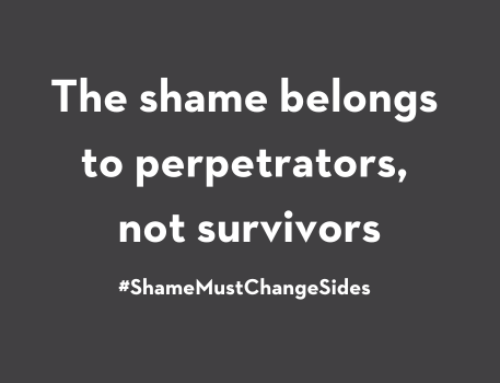
It blew my mind how quickly people jumped to the man’s defense, and also questioned my read of the situation, as though they, people who were not present, somehow understood what happened better than I did.
Why is our knee-jerk response always to deny the woman’s experience in these situations? To question her, to minimize her feelings, to outright blame her even?
This is rape culture, the way we deny women’s voices and experiences, justify men’s behaviour, and generally send the message that women are either over-reacting or asking for it.
Why can’t we just acknowledge that these things happen, they happen a lot, they make us feel awful, and they are never the fault of the person they happen to? How hard is that?
I cannot even fathom how excruciating it must be for a woman who has been sexually assaulted and who is trying to get justice. The denials of her reality, the defenses of his behaviour, the questioning and outright blame loaded on her for something that was done to her by another person. The indignity that she must suffer in order to defend herself (because let’s be honest, that is what we must do) and turn the lens of blame toward the one who is actually responsible. It is not surprising that most women simply do not report their sexual assaults, let alone take them to trial.
I was so moved by Emily Doe’s victim statement in the Brock Turner case. Her courage and determination in the face of what she has been through is astounding.
The details of that case simply blow my mind. There were witnesses, for God’s sake, who saw (literally saw with their own eyes) and apprehended Turner sexually assaulting an unconscious woman behind a dumpster. Witnesses who were so disturbed by what they had seen that one of them could apparently barely speak to the police through his tears.
Most assaults happen behind closed doors and in the absence of witnesses. And they happen ALL THE TIME. Sometimes they happen in situations where the victim and perpetrator were seen kissing or flirting earlier in the evening, where witnesses can confirm interest, and seemingly by extension, potential ‘evidence’ of consent. These cases are often mired in the kind of “blurred lines” (speaking of rape culture…) that make it so easy for the guilty to escape punishment.
The lines could not be more clear in the Turner case, his guilt is absolutely beyond question, and still he is barely punished. Still she is asked outrageous and insulting questions that claw at her very dignity. As though the assault was not bad enough, she must be re-victimized over and over again in her attempt to get some measure of justice. How can it be this way?
This is rape culture, when instead of sending the clear message that sexual assault will not be tolerated, the judge expresses concern that jail time will have “a severe impact” on the perpetrator.
Do we really expect women to come forward when we treat them this way? When victims are the ones on trial? When we tell women, over and over again, in ways both small and large, that what happens to them is simply not important, or worse, that it’s not even real? That when we are on the receiving end of men’s aggression, in everyday ways like cat-calling and harassment, or in huge and horrifying ways like sexual assault, that somehow we are the ones responsible?
I understand that many people don’t want to hear about rape, that the topic is ‘uncomfortable’, and we’d rather pretend it isn’t happening. But that’s not a solution, and it certainly isn’t going to change anything. 20 Minutes of Action for Change is a perfect example of what happens when, instead of silencing women’s voices, we acknowledge their truth and begin to face these problems head on.
We all have a role in shaping the culture we live in, and it’s time we start to own our responsibility.
Learn More
- 10 Reasons Violence Against Women is Still a Problem in Canada
- Street Harassment Isn’t a Compliment
- It Starts With Us
- Take the pledge to join GEN1 and help build the first generation free of violence against women and girls.
- Sign up for our e-newsletter to have our latest stories and resources sent to your inbox.
- Follow us on Facebook and Twitter to join a national conversation on ending violence.







